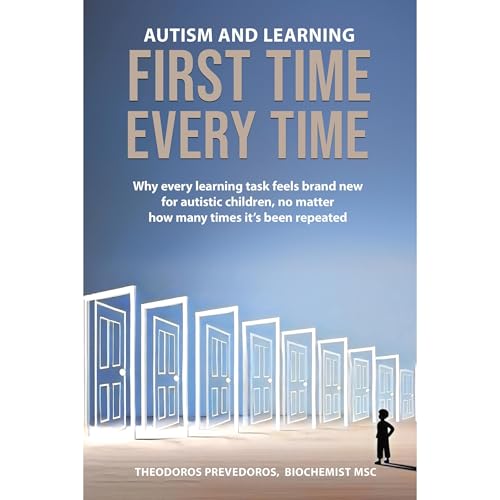
Autism and learning: First time… Every time
Why every learning task feels brand new for autistic children, no matter how many times it’s been repeated
No se pudo agregar al carrito
Add to Cart failed.
Error al Agregar a Lista de Deseos.
Error al eliminar de la lista de deseos.
Error al añadir a tu biblioteca
Error al seguir el podcast
Error al dejar de seguir el podcast
Obtén 3 meses por US$0.99 al mes
 Exclusivo para miembros Prime: ¿Nuevo en Audible? Obtén 2 audiolibros gratis con tu prueba.
Exclusivo para miembros Prime: ¿Nuevo en Audible? Obtén 2 audiolibros gratis con tu prueba.
Compra ahora por $6.99
-
Narrado por:
-
Virtual Voice

Este título utiliza narración de voz virtual
Does it seem like every cognitive or social skill of your child disappears overnight? This is pretty common in autism and as weird as it may sound, it's all about "energy efficiency." You see, when we humans start making millions of synaptic connections in order to aquire new knowledge we need fast and abundand energy supply within fractions of seconds. This kind of fast energy can only be supplied by the phosphocreatine energy system, and this is where genetic traits and envirnomental insults may come into play, reducing the capability of forming solid and efficient synapses.
In "Autism and Learning: First Time… Every Time" biochemist Theodoros Prevedoros explains the misconception that autistic individuals cannot learn, why learning new skills can feel like starting from scratch, and how the natural molecule creatine (often mistaken as a body-building supplement) can be the key to restoring their learning potential. Drawing from 16 years of research and experience with over 600 cases, this book will help you understand:
- The science behind brain energy and network efficiency: Why every new task requires fresh synaptic networks that demand an abundance of energy, and how children with autism may struggle to access this energy giving rise to unique presentations and experiences.
- Creatine's role as an “energy provider”: How creatine can support the brain's energy needs, especially during learning, making the learning process less taxing and more efficient for autistic children.
- Which other factors, besides genetic mutations, may interfere with proper brain connectivity and explain why girls and women are underdiagnosed (or not).
- A clear and safe protocol for creatine supplementation: You will find a practical and personalized guide to introducing creatine, integrating it with therapies your child may already be using.
- Actionable dietary and lifestyle recommendations: Discover strategies to support your child’s creatine levels and improve their overall brain function.
- Real-life examples of how creatine has helped autistic children: Learn how children who struggled with tasks like tying their shoes, speaking, or holding a pencil have improved when following the creatine protocol.
Since autism exists on a spectrum, each piece of the puzzle we solve is essential in helping our children, both low and high functioning, acquire social and cognitive skills.


